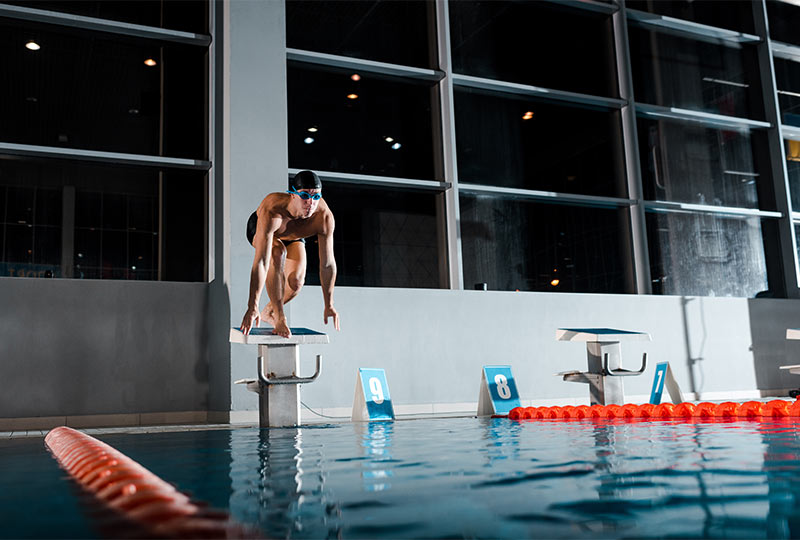Lounging by the pool may be a great way to relax, but it’s no way to recover from an intense swimming session.
How you finish your swim sets can significantly impact how well your body recovers and adapts to training. Cooldown times should be a part of any swimmer’s routine.
What Is a Cooldown?
A cooldown is a low-intensity exercise that follows high-intensity training or competition. It allows your body to return to its resting state gradually and promotes recovery by helping you remove metabolic waste products like lactic acid from your muscles.
Some typical cooldown activities for swimmers include slow laps, gentle stretching, and foam rolling. These exercises relax tight muscles and improve blood flow, which is essential to optimizing recovery.
Why Are Cooldowns Crucial after Swimming?
- They reduce muscle soreness by flushing out lactic acid.
- They improve flexibility after intense exertion.
- They lower your heart rate gradually to avoid dizziness or lightheadedness.
- They prevent injury by easing your body into a state of rest.
Think of cooldowns as the bridge between your high-energy swim and a fully relaxed state, ensuring your body transitions smoothly after intense activity.
How Long Should You Spend Cooling Down?
While the 5-10 minute cooldown rule generally applies, there’s no one-size-fits-all answer. Your cooldown should consider your body’s unique requirements, the intensity of your swim, and even your age.
Here’s how different factors influence cooldown durations:
1. Physical Condition
- Beginner swimmers should prioritize longer cooldowns (10–15 minutes), focusing on gentle stretches and easy laps to allow their body to adjust.
- Veterans or competitive swimmers may only need 5–10 minutes of cooldown, as their bodies are better adapted to strenuous exercise.
Pro Tip: Listen to your body. If your muscles still feel tight after a short cooldown, go for an extra few minutes of light activity.
2. Age
Age significantly impacts how your body recovers post-swim.
- Younger swimmers under 25 recover quicker due to higher metabolic flexibility. A 5–7 minute cooldown can suffice.
- Older swimmers, especially those above 40, may want to extend cooldown times to at least 10–15 minutes, as recovery takes longer to relieve muscle stiffness.
Consistency and focus on proper form in your cooldown movements make all the difference, particularly for older age groups.
3. Intensity of Your Swim
The harder you push yourself, the longer your cooldown should be.
- High-intensity swims (sprints or challenging drills) require a 12–15 minute cooldown to flush out lactate.
- Moderate swims (steady freestyle for fitness) can benefit from 5–7 minutes of cooldown.
4. Other Contributing Factors
Recovery times also depend on external factors like:
- Water temperature: Cold water can stiffen muscles, requiring a longer cooldown.
- Hydration levels: Hydrated muscles recover faster. Keep water or an electrolyte drink nearby during and after your swim.
- Consistent stretching: Incorporate dynamic stretches during your cooldown to maintain flexibility and reduce soreness.
5. Advanced Recovery Support
For swimmers looking to optimize fully, consider complementary recovery techniques such as foam rolling, massage, or compression gear post-swim.
Ask Your Local Swimming Experts at Blue Buoy
Navigating swimming recovery can feel daunting — especially if you’re new to it.
Want to know more? Call us at Blue Buoy! We’ll help you devise a plan that works best for you.
We specialize in personalized coaching and training to help swimmers of all ages and abilities reach their full potential.
Don’t let poor recovery hold you back from your swimming goals. Call us today!
FAQs: Swimming Recovery Times
Q. What happens if I skip my cooldown?
Skipping cooldowns can increase muscle tightness, lead to delayed-onset muscle soreness (DOMS), and elevate your risk of injury. They’re a critical part of any workout — don’t skip them!
Q: Should I stretch before or after swimming?
Both! Stretching before swimming reduces the risk of injury, while post-swim stretches aid recovery and flexibility.
Q: Can a cooldown double as a warm-up for another workout?
Yes, but only if the activities are complementary (e.g., swimming before yoga). To make the transition seamless, keep your cooldown longer and lighter.
Q: Are cooldown times different for open-water swimming?
Due to varying conditions, open-water swimming often engages more muscle groups, which generally requires a longer cooldown than pool swimming.
Q: Can I do my cooldown out of the water?
While in-water cooldowns are ideal, you can blend them with out-of-water activities, light jogging, or dynamic stretches.
Q: How do I know if my cooldown was effective?
An effective cooldown will leave you feeling less tense and more relaxed. Signs include reduced muscle stiffness, a steady heart rate, and an overall readiness for your next activity.
Q: Can beginners shorten their cooldowns?
We don’t recommend it. Beginners may need longer cooldowns as their bodies adapt to swimming demands. Prioritizing a thorough cooldown helps prevent soreness and improves recovery.
Q: Is it okay to skip foam rolling after swimming?
While foam rolling isn’t mandatory, it can significantly enhance recovery by loosening tight muscles and improving blood flow. Skipping it occasionally won’t harm you, but making it part of your routine can lead to better long-term flexibility and recovery.



Leave A Comment